The master of revivalist house talks rave epiphanies, his nerves on first meeting KiNK and why he’s not afraid of selling out.
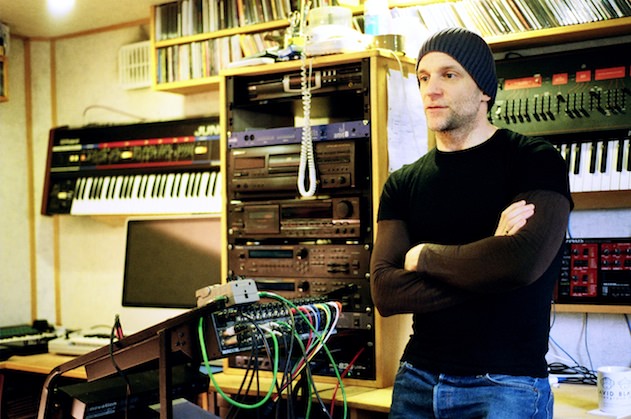
One of the consequences of having an avid photographer as a brother is that Neville Watson’s life has been documented from a very early age. Neville and his brother Gavin grew up immersed in punk and skinhead culture, and Gavin’s photo books Skins and Skins & Punks are definitive visual histories of early 80s street culture in the south of England. But it was the classic tale of a chemical-fuelled epiphany – documented in the pair’s outstanding book Raving ’89 – which shifted the brothers’ attentions to dance music.
Neville’s life has revolved around house and techno ever since, but it’s with his recent work, which mines the rich musical culture of late 80s Chicago for inspiration, that he’s found the most commercial success. His take on classic house – especially in collaboration with Bulgarian producer Strahil Velchev aka KiNK – predates the current trend for revivalist sounds by the best part of a decade and, more importantly, forges its own updated, contemporary take on those 80s reference points.
We visited Neville in the studio he shares with Nick Woolfson of Mock & Toof to discover the ins and outs of his working process and hear his thoughts on the state of dance music. Perhaps unsurprisingly for someone with such a singular vision of the way his music should sound, Neville is equally as sure of his opinions. He’s by no means the controversial rent-a-quote type, but he’s clearly a man who thinks deeply about music and has confidence in his own beliefs. Over the course of our afternoon together, he offers a surprising take on the idea of selling out, explains why he’s always been most excited by ‘rough’ music and suggests a solution to the problem of resellers charging grossly inflated prices on Discogs (“I wanna go back to the punk thing with people stamping ‘Pay no more than £5.99’ on records – if one of my records went like that I’d like to keep a load back and continually put them on there for four quid”).
Attack: How did you meet Nick and start sharing his studio?
Neville Watson: I was in the pub having a drink and some friends of mine introduced us. It was one of those really awkward situations where people think you’ll have loads in common just because you both make music. I said: “What sort of music do you make?”
He said: “Ambient. It’s called Sounds From The Ground, have you heard of it?”
“Nah, not really.”
“What do you make?”
“House and techno.”
“OK. I do a bit of a more dance-y thing too.”
“Yeah? What’s it called?”
“Mock & Toof.”
“We remixed you!”
So that was that. We started working together and when I got married last year I moved out of my old place to move in with my wife. I didn’t really know what to do – I thought I’d just have to do everything off my laptop at home for the moment, but Nick turned round and said I could put my stuff in here. He was starting up the label so he said I could help out with a bit of A&R and social media in return. I feel pretty blessed, to be honest with you. It’s just such a lovely thing to do.
It’s made such a difference having the studio out of my home. It had worked for me for a long time but I was getting really quite bored of having it in my living space. There’s just too many distractions. But here there’s no internet connection, you can barely get a phone signal, so all you can do when you’re in here is work, which is brilliant.
I lived in a Victorian conversion and it had big high ceilings and a bay window. I was using K-Rok monitors and I never really felt like it was set up properly.
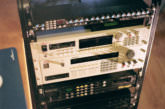 With the sound bouncing all around the space?
With the sound bouncing all around the space?
Yeah, but it did me good. You learn to work with a space. I think that’s one of the problems with a lot of the production magazines. You start reading them and you think you’re doing everything wrong. Oh shit, I should be doing this and I should be doing that… You start messing around with your sound, whereas you’re used to working in a certain way.
The more artists’ studios you visit the more you realise how many people are breaking a lot of rules and making brilliant music. Look at the studio piece we did with Danny [Legowelt] – people might say he’s got his monitors in the wrong place or whatever but he’s making some pretty good stuff…
Yeah and sometimes I’ll go to play his stuff out and think, ‘Oh, that’s a bit of a shame, it doesn’t quite sound…’ But it’s so full of atmosphere. It’s about the vibe of it. He makes the best of that lo-fi thing and it might not always completely cut through on a big sound system but I’ve got to honestly say I can’t think of anything he’s done that I haven’t liked. Really.
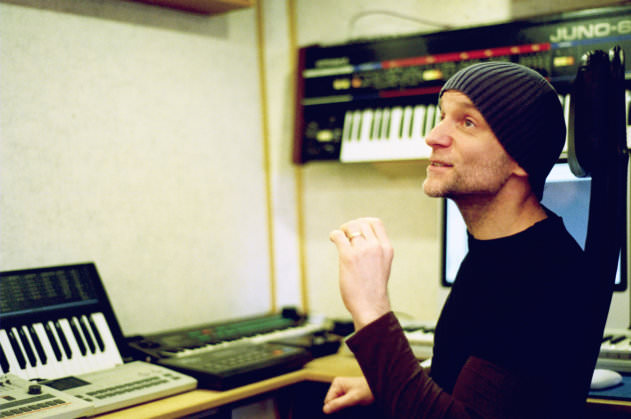
Neville’s setup is still based around a selection of old favourites including the Roland Juno-6, Korg Poly-800, Roland TR-707 and Yamagha DX100
The lo-fi thing ties into some of the revivalist acid and jackin’ stuff, some of the Chicago-influenced stuff and some of the so-called outsider house that’s around. Is that a sound that you’ve deliberately tried to use in your music?
I think I’ve always kind of been like that. You don’t realise until you’re a little bit older and you start drawing a line back through things, but I realised that even as a kid the music I liked was always quite bottom-heavy and quite rough. As a six year-old I got into rock’n’roll and I was rabidly into it at six. While other kids were out playing football I was listening to music. Rockabilly drenched in reverb.
Then I got into ska and reggae through the Specials and Madness, and like people do now with house music you start going back. So I went back to the 60s to the really early ska and rocksteady, and all that stuff was done by just getting the band into a studio with a microphone hanging from the ceiling and getting them out again as quick as possible.
I kind of like music that sounds like it’s all about to start falling apart at any given moment. I think it was natural, and I never realised this until I was in my thirties. There’s plenty of clean music that I do like but as a rule I like it rough. Obviously punk was a big influence on me. It was more my elder brother’s age group but it was around all the time so I kind of absorbed it, then I got into the second or third wave of punk bands.
I realised that even as a kid the music I liked was always quite bottom-heavy and quite rough.
So this was early to mid 80s punk?
Yeah. It’s something that I try to avoid talking about really, because it’s so misconstrued. You try to explain things to people and they don’t get it. They never really did.
Your brother says in Raving ’89 that you were initially quite resistant to dance music.
Yeah, because before that it was all nightclubs, and nightclubs were places that we weren’t allowed into. In the 80s if you had a crop you only had one for one reason and that was because you were a skinhead. Even if you were losing your hair you didn’t shave your head. I’ve hardly got any now so I shave it but back then people would comb it over, even young guys.
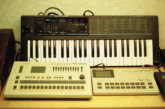 I was going out with a girl at the time who was getting into very early house but she was going to all these appalling Ritzy nightclubs to listen to it. My brother told me I’d really like it but I was like, ‘I’m not sure.’ The obvious thing happened: I went and took an E and that was it.
I was going out with a girl at the time who was getting into very early house but she was going to all these appalling Ritzy nightclubs to listen to it. My brother told me I’d really like it but I was like, ‘I’m not sure.’ The obvious thing happened: I went and took an E and that was it.
It’s the classic cliche, isn’t it?
It changed my life like that. [clicks fingers] Just totally changed my life.
I could see that my brother and his mates were having a good time, but my brother always kind of flitted. Even though he was a skinhead he was a classic photographer, really – he was an observer, even when he didn’t have his camera. But he was also a bit of a head. He liked to go and take acid and find weird exotic hallucinogens. We’d always done mushrooms and stuff like that so I wasn’t totally resistant to it. I thought I’d probably try an E but I didn’t know if I really wanted to go to a rave. There were a couple of the more acid tracks that I liked and I found them quite interesting but the more vocal things at the time I wasn’t sure if I was into them.
So I was initially quite resistant but that soon got washed away when I went to a Sunrise party and took an E, basically. I started coming up on this E and thought, ‘This is a bit shit really. I wonder if I could walk home from here.’ It was about twenty miles from my house. Then it properly kicked in and that was it. My life has never been the same since.
Yeah?
Yeah, that’s true. It sounds a little bit overblow but the realism of it is that it certainly kind of cemented to me what I wanted to do with myself. I grew my hair, spent the next couple of years raving then started learning how to DJ – I was already DJing at the time playing reggae and stuff but I learned how to mix – then I opened a shop in Windsor with a couple of friends of mine. That shut so I went and worked as a resident for this place Checkpoint Charlie in Reading.
When did you start producing?
1996. It was always something we were gonna get into doing but you needed to save up some serious money for kit back then. One of the guys I had the shop with had a little home studio, so I went and messed around with him around ’94, ’95, but I didn’t put anything out until ’96. As we shut the shop we started a label. I was running that until around 2004, then I had this chance meeting with KiNK online in 2005 and our first thing came out in 2007.
I was always really into the pseudonym. Most of the stuff that came out on Mighty Atom was mine under various pseudonyms. It’s a shame now because the internet’s great but it means you can’t really keep things like that a secret.
People are a bit more obsessed with building up their image and their brand now.
Yeah but I think now with the ability to cut cheap dubplates you can do things like just pressing ten records and never tell anybody who it is. Then that won’t instantly go online. I know a few people who are starting to do that. Obviously I can’t tell you who they are!
It’s something that I’d definitely like to explore, doing a bit more of that. But being quote-unquote ‘underground’ for so long I’d got to the point where I was thinking, ‘No one’s taking any notice of this. What’s the point?’ Not that you want recognition, but you want to be able to know you can pay your rent. Which leads onto the whole other thing – people are a bit too scared of being seen to sell out. Well, who’s to say they bought in in the first place? That’s all very well for other people to say when they’ve got a job that they go to and they just consume music. There’s a really good interview with Andrew Weatherall where he says he’s had the bailiffs knocking at his door. It’s not a pleasant experience. Doing that to please other people because they’ll be upset if they think you’ve sold out, it doesn’t work.
People are a bit too scared of being seen to sell out. Well, who’s to say they bought in in the first place?
The story of how you met KiNK online has been fairly well documented, but can you tell us a bit about the working process there? You worked together for a couple of years without actually meeting him…
We got more done like that!
Really?
Yeah, but I think it’s just a circumstantial thing. We both got busier – particularly him – and we’ve got less and less time to work together. Once we had met it didn’t make as much sense to work without being in the same room. When we do see each other we’ve got a million things that need finishing.
We’d done quite a few tracks and remixes without ever having met. We were doing this remix of DJ Sprinkles and I’d send him a part and be waiting like, ‘What’s he doing? Come on, get a move on.’ It was like playing tennis by yourself. You’d serve it and it’d not come back. He was like, “I can’t see the waveform.”
“What, is the file not opening?”
“No, I’m using Buzz. It’s like you trying to edit that stem in your 950.”
“And you didn’t think to tell me this?!”
I thought he was using Ableton or something. It bent my head! He said that it’s like a tracker and he explained it to me. But, you know, he knows how to rinse that thing and he gets a really good sound out of it.
The day I was going to meet him for the first time, I thought, this is it. You can sometimes get on with someone when you’re talking to them online then not get on with them in real life. I’ve got the English disease where you have to take the piss out of everything at every given opportunity. I’d be doing that on Skype and thinking, ‘Oh, fuck me. What if he doesn’t get it?’ But he totally gets it. He probably gets a bit tired of me doing it…
As soon as I met him I knew we were going to get on, but when I called my wife and she asked how it went I said, “It’s terrible. He’s such a wanker. I really didn’t like him. We didn’t get on at all.” She was genuinely upset. Then when I told her I was joking she was really pissed off with me.
He’s become a really good friend. He was at my wedding – he came straight from a gig in Paris to the church, with his suitcase.
I called my wife after I met KiNK and said, 'It’s terrible. He’s such a wanker...' She was genuinely upset. When I told her I was joking she was really pissed off with me.
Do you plan to do much more live stuff with him?
Yeah, definitely. We’re doing a thing on December 7th where we’re doing the whole night at Corsica Studios. What we’ve done now, as of last year, is started basically from scratch. We’d got to the point where we had an APC40 and I was launching clips and it just got to the point where it felt like it was tedious and I was cheating people. We always had a point in the set where we’d improvise and it always got the biggest reaction. I don’t know what that is. The girls who’ve staggered into the club by accident with a hen party and they’re gurning in the corner – maybe they don’t know what you’re doing, but all of a sudden their energy comes up and they’re going mental.
Obviously the spods at the front can see what you’re doing but not everybody can. It always gets the biggest reaction.
There’s something incredibly boring and safe about a perfectly rehearsed performance, isn’t there? It’s somehow much more exciting when you hear a note out of place and you realise it could all fall apart at any time. Suddenly it’s exciting again. That fear of someone fucking up in front of you.
Yeah, we’ve had some proper clangers and people go mental! You can make a lot more mistakes when you’re playing live than when you’re DJing.
Dom Capello from the Sub Club was telling me last time we went there that he’s made two mistakes in seventeen years playing there week in week out and they still get remembered…
The plan is to do more stuff but he’s super busy at the minute and stuff’s ramping up for me because I’ve got the album coming out.
That’s finished is it?
Yeah, it’s ready to be mastered. It’s called Songs To Elevate Pure Hearts, coming out on Crème Organization in May.
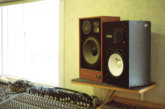 It’s ironic that KiNK’s developed a bit of a reputation as a hardware guy but he actually mainly produces his music in software. You’re much more hardware-focussed?
It’s ironic that KiNK’s developed a bit of a reputation as a hardware guy but he actually mainly produces his music in software. You’re much more hardware-focussed?
I’ve been using hardware all along but I came from the days when that’s just what you had to do. You needed an Akai, a desk, an effects unit and a shitty compressor. I don’t know what’s happened to my DBX, actually. The DX100 was the first thing I ever bought.
Is all the gear the original stuff that you bought back in ’96?
Yeah, I bought the DX and the 950 and I’ve had the Mackie desk from the word go. My friend who I had the shop with stopped making music and moved to the States so I bought the desk off him and he gave me the Boss SE-70, which I believe was very popular with Global Communications for the vocoder on it.
The 707 sounds like it’s all over a lot of your stuff.
Yeah, it is, but I’ve been using it less and less actually. The Kawai is a loan off a friend of mine, Justin Drake, and it’s a nice alternative to the 707 – it’s got those 12-bit sounds. I think what keeps me coming back to the 707 is the immediacy of it. That’s why it’s so great to take out live. If somebody could make a step sequencer with an interface like that, I’d love it. I’m using it more and more for controlling the Juno-6 these days. The bulk of the sounds on my tracks come from the Juno.
The Poly-800’s really nice for wobbly strings and stuff and it’s quite easy to edit, which the DX isn’t. I can fumble my way around the DX but I’m not like Danny [Wolfers], I couldn’t program it from scratch!
It’s worth it for the Solid Bass preset alone, though.
Solid Bass is what I bought it for back in ’96!
How’s it all sequenced?
Usually Logic’s the master clock, the 707’s synced up doing its own little patterns and then I’ll maybe trigger some patterns on the Juno and record that into the computer. Other times I’ll just use Logic as a hard disk recorder, sync the drums and Juno up, put them on the desk and do mutes off the desk as maybe a ten, fifteen minute jam then go in and chop it around if it needs it. Obviously when you’re doing that it’s a little bit more hypnotic. If I want a bit more structure I’m less likely to do it like that. As I’ve got more into Ableton I might launch clips and do a long pass, then take the drums out of the computer and put them into the sampler.
It all depends how I’m feeling really. I don’t particularly have one set way of working. You’ve got to try and keep it interesting to yourself otherwise it gets stale and you don’t look forward to doing it. There’s such a wide scope of what you can do with music – why would you want to put yourself in a rut?
Three essentials
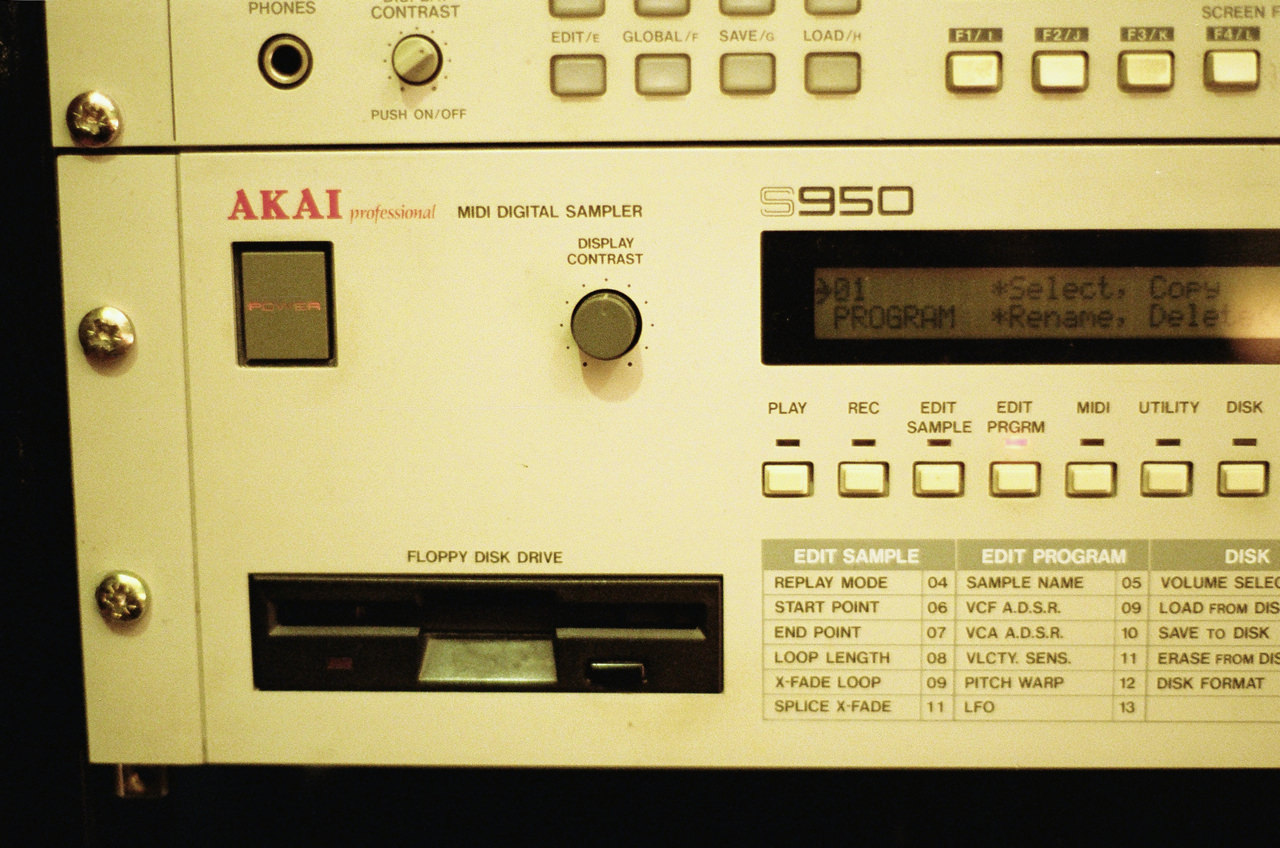
Akai S950
I still use the 950 for drums. It's got such a tough sound. It sounds slightly perverse but I actually really like floppy disks. I feel a bit nostalgic about them. Where something like Ableton's great because it's so quick, I think sometimes the process is important. There's something about sampling off a record and chopping it up.
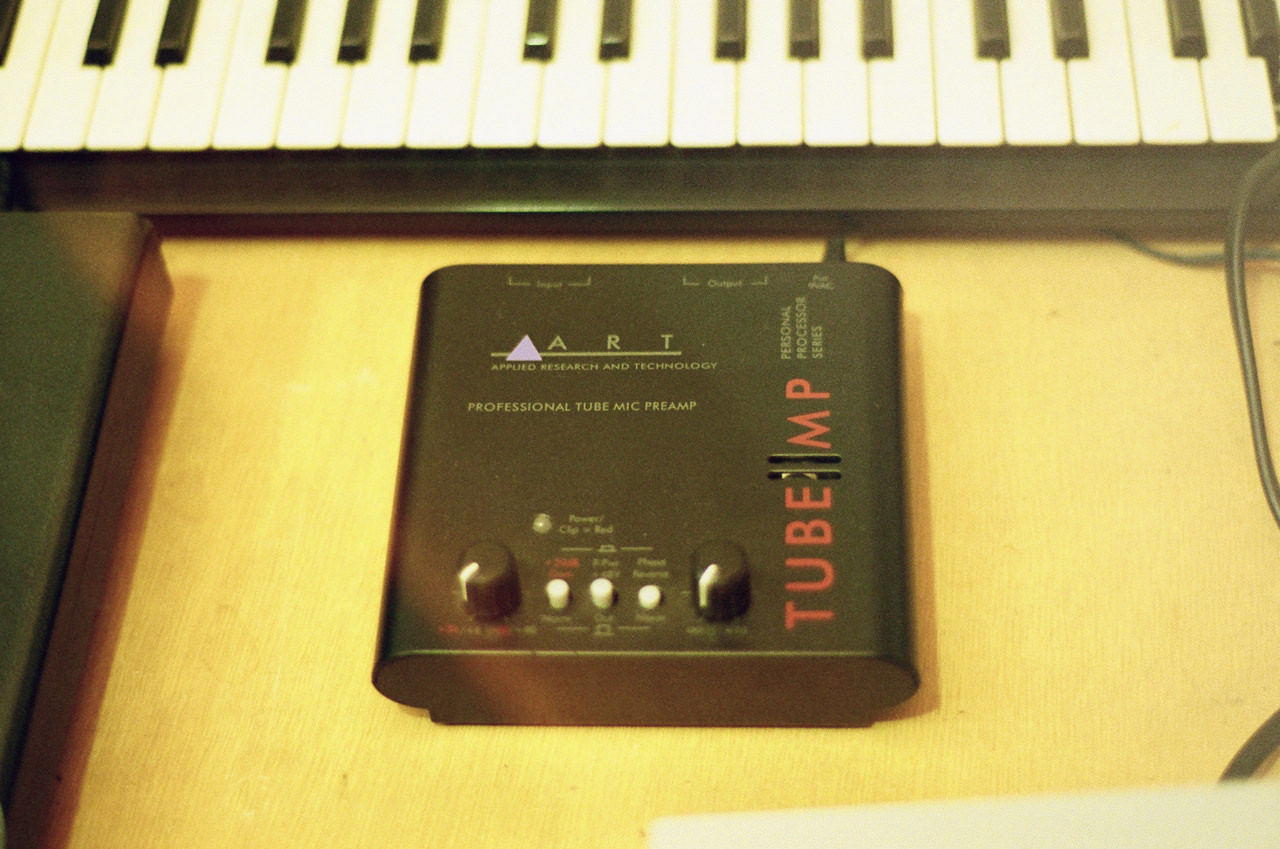
ART Tube-Amp
Pretty much any mono synth goes through this crappy little thing. It's about 40 quid and it's probably got some really cheap little valve in it but it's nice to overdrive it. It limits it and compresses it in a completely different way to software. I don't know why – I don't really care – but it sounds great.
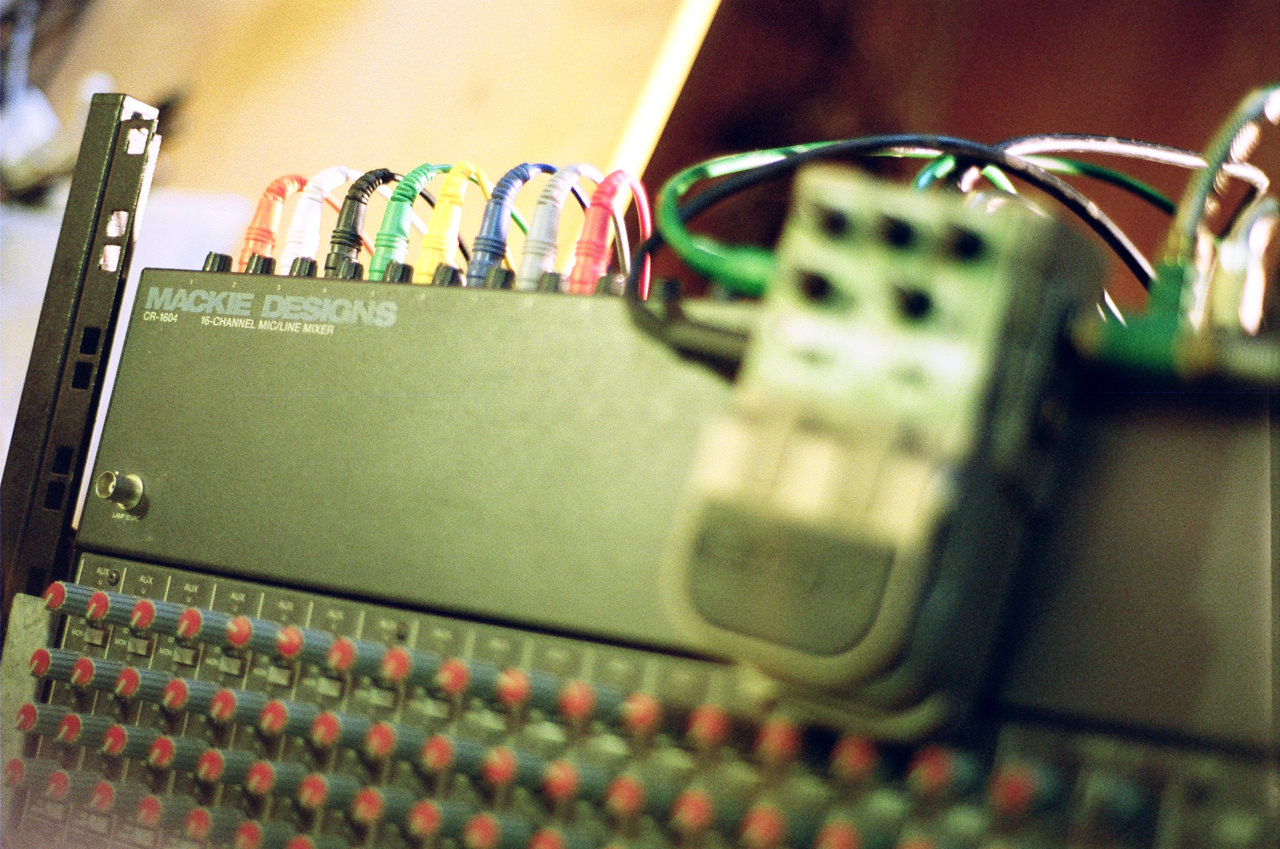
Mackie CR1604
I would ideally like something a little bit warmer but it does the job. It can be quite brittle. It's big with a lot of drum and bass producers. It gives that really hard sound to the snare.
The One Four Green EP is out now on Teng Records. Songs To Elevate Pure Hearts will be released by Crème Organization in May. Find Neville on Facebook, Twitter and SoundCloud.
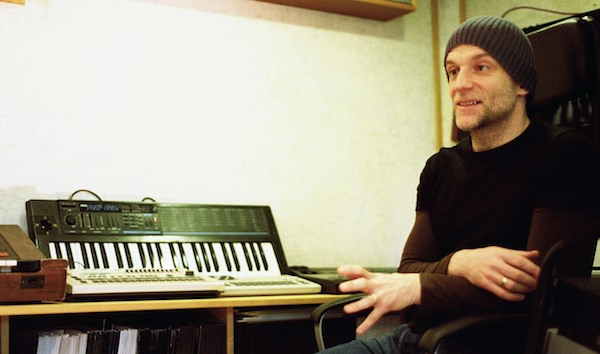
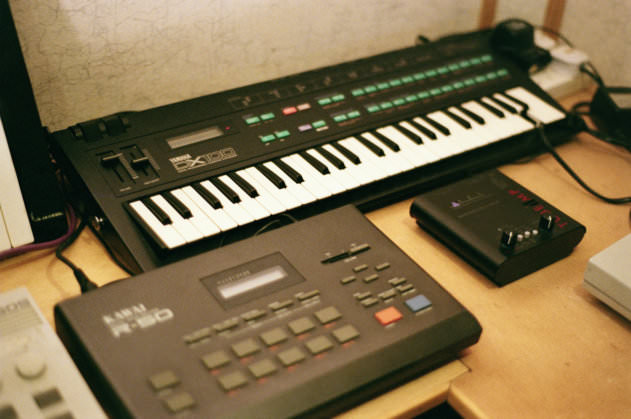
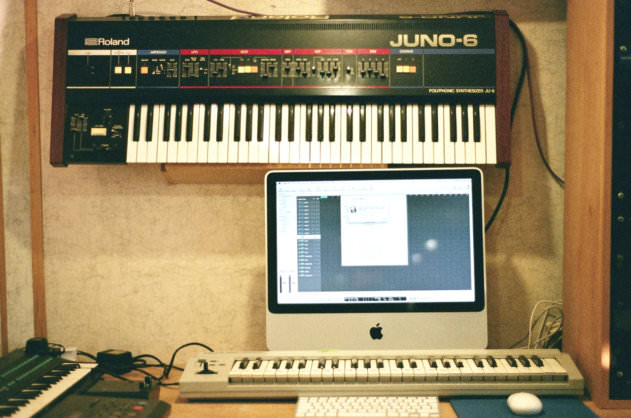
11.14 AM
Good interview!